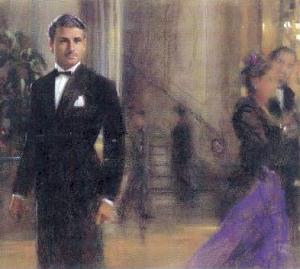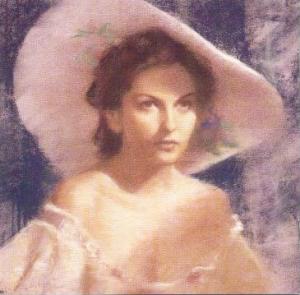************************************************************** EDITOR’s RECOMMENDATION January 2003 **************************************************************
Rebecca
Music composed by Franz Waxman
Joel McNeely conducting the Royal Scottish National Orchestra
Available on Varèse Sarabande Records (VSD-6160)
Running Time:54:32
Crotchet Amazon UK Amazon US

This new recording of Franz Waxman’s own favourite score, out of the 144 he scored in Hollywood, competes with the 8-minute Rebecca suite within ‘Sunset Boulevard – the Classic Film Scores of Franz Waxman’ compilation (RCA Victor GD80708) recorded by Charles Gerhardt and the National Philharmonic Orchestra in 1974, and a 72-minute album devoted to the Rebecca score on Marco Polo 8.223399, recorded in 1990 by Adriano conducting the Czecho-Slovak Radio Symphony Orchestra.
If just a memento of the main themes is required, look no further than the Gerhardt recording. The suite incorporates ‘Prelude’, ‘After the Ball’; ‘Mrs Danvers’; ‘Confession Scene’ and ‘Manderley in Flames’. Although recorded in the 1970s, the sound is stunning (so too were all the other recordings in Gerhardt’s Classic Film Scores series). Gerhardt pulls all the stops out to deliver a brio performance full of attack and darkly shaded romance. He creates a palpably tingling atmosphere of evil and menace and you can just imagine the flames crackling fiercely and unrelentingly through Manderley.
The digital Varèse Sarabande sound is even better, and McNeely scores immediately with a chillingly effective Main Title/Foreword /Opening Scene that creates an ominous brooding atmosphere with swirling string figures and strident brass as the heroine dreams she is returning to a deserted, desolate, ruined Manderley. Adriano is not far behind, but his reading is spoilt by a wayward, wavering trumpet that also mars the opening Selznick International Trademark music
Both recordings include the charming waltz ‘Hotel Lobby’ for an early meeting between the Laurence Olivier as Max de Winter and the Joan Fontaine character. McNeely’s waltz is light-hearted, dreamy and full of romance, Adriano’s slow and deliberate. Two ‘Tennis Montage’ cues follow in both recordings. Both conductors capture the girl’s shyness, naïveté and vulnerability, her dreaming and yearning for romance. The music reflects her innocence, and the high spirited nature of her romance; its humour and intensity but occasionally shadows intrude, a forewarning of the threat at Manderely. McNeely’s character sketches are sharper, his phrasing more appealing; this is a joyous courtship. Both include the attractive intimate dance music.
Adriano’s recording has some eighteen minutes more music than the new Varèse Sarabande album. ‘Morning Room’ carries the dark foreboding atmosphere forward with the Rebecca theme on the novachord. [The novachord is an electronic keyboard instrument with a sound not unlike a Hammond organ. It was used to create eerie effects in numerous Golden Age scores.] ‘Beatrice’, another track exclusive to Adriano, returns the music to a warmer romantic mood with a tender waltz and humorous, timorous figures and a hint of the Rebecca theme as the girl learns a little more about her predecessor.
The Walk to the Beach/The Boathouse and Return from the Boathouse are on both recordings. The walk is carefree, reminiscent of the earlier courting music but the boathouse has altogether chillier associations; the music clouds significantly adopting an aura of anxiety and evil with Rebecca’s theme brooding mistily. Crushed woodwind cries, as though of an animal in pain, and swirling, screaming strings ratchet up the tension. At last the music calms down as the by-now rattled heroine leaves to a questioning statement of her theme.
There is more additional music on Adriano’s recording: a sparkling cue for harp, lush strings and celeste announce the beauty of the girl’s ‘New Dress’ and the innocence and purity of its wearer. ‘Sketching Room’ is another light-hearted cue - a breezy, then rueful reprise of some earlier courtship material. ‘Manderely Ball’ is a waltz, lilting and passionately romantic. ‘After the ball – The Rockets – At Dawn’ is tense material with Rebecca’s theme sounding even more obsessive, the music ever more eerie and threatening; the novachord implying Rebecca’s malign influence reaching beyond the grave in a persistent crescendo against a tremulous solo violin suggesting the girl’s plight.
Of course some of the foregoing material is heard under different headings in McNeely’s recording. Both CDs include tracks entitled ‘Rebecca’s Room’ and ‘The New Mrs de Winter’. McNeely’s reading is very potent; Waxman’s eerie, lascivious music brilliantly evoking the decadent Rebecca, beautiful, treacherous, corrupt and corrupting - her evil spirit threatening the new Mrs de Winter whose virtue, the music hints, will ultimately triumph. Adriano uses the novachord most effectively to enhance the chill of this ghostly scene with telling dynamics and wide perspectives. Of course Rebecca’s malign influence has also infected Manderley’s sinister housekeeper Mrs Danvers and she is portrayed on both albums. McNeely uses Waxman’s original scoring that was not fully used in the film. Mrs Danvers’ music is very much like that of Rebecca, dead-sounding, ghostly, evilly obsessed; and twisted, suggesting lesbian love; in fact the novachord is used for the possessed Mrs Danvers as well.
‘The Confession Scene’ plays Rebecca’s theme as a straightforward romantic melody until her essentially rotten character (echoed in that of the Mrs Danvers) is revealed at which point the theme becomes twisted and full of malice. McNeely does not put a foot wrong, Adriano is more hesitant, the climax more measured and again the use of the novachord is effective. (McNeely eshews its use in his recording preferring the effects to be created more naturally using conventional instrumentation.)
The music for the climactic scene when Manderley goes up in flames after Mrs Danvers evil machinations to destroy the girl go awry, is most exciting. Adriano’s reading is a little too deliberate with some curious hesitancy. McNeely is much more spontaneous and his music really thrills.
A worthy reading of a masterly, classic score that is wonderfully atmospheric and full of brilliant characterisations. This recording must now be the first choice but if you want a more complete version go for Adriano on Marco Polo; if you want just the main themes go for Gerhardt on RCA..
Ian Lace
5
P.S. Now, Varèse Sarabande, please let us have a complete recording of Franz Waxman’s most popular score, Prince Valiant followed by another of his equally memorable The Spirit of St. Louis!
Return to Index

